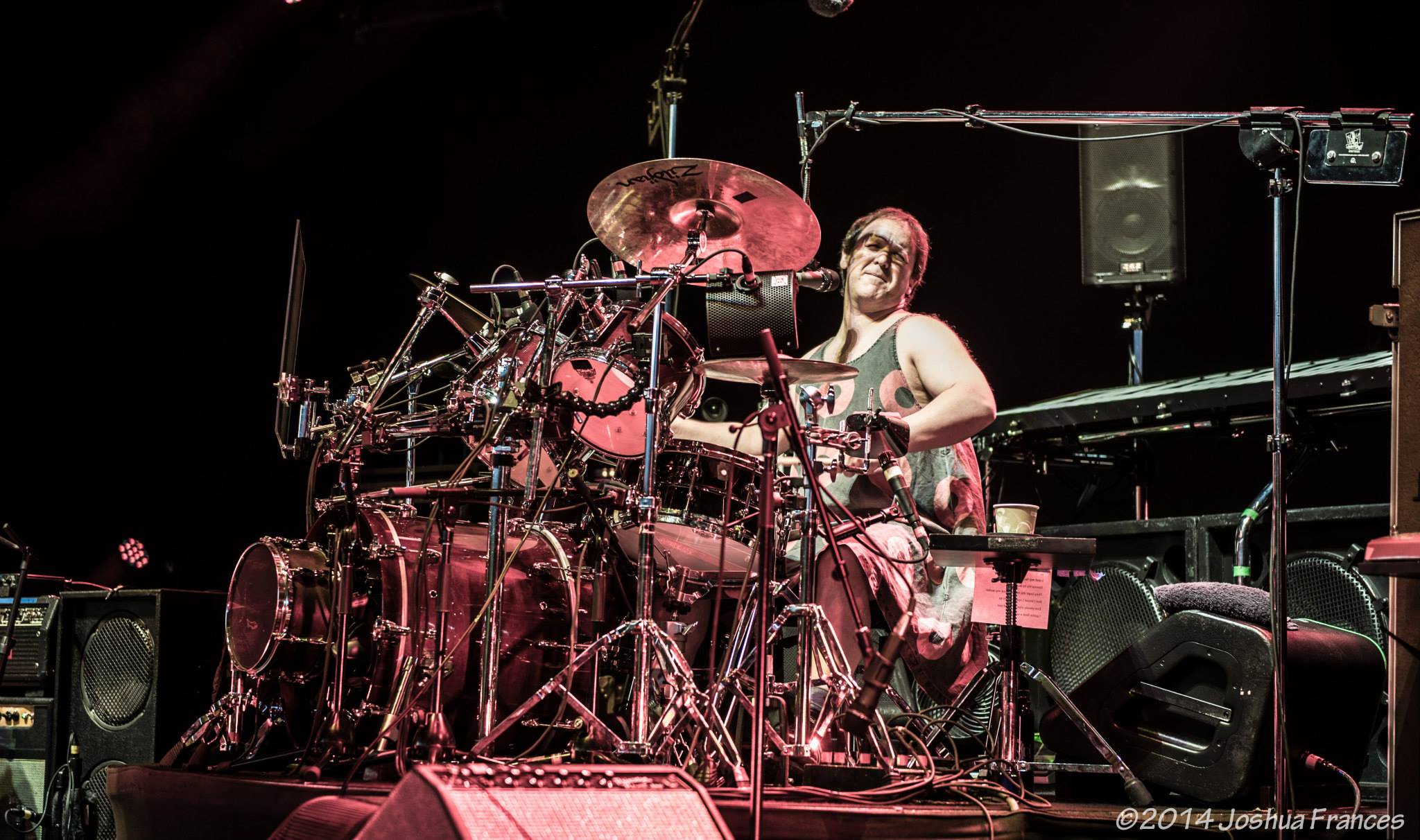Little Drummer Boy: Local Hero Jon Fishman Reconnects with His Syracuse Drum Teacher
This interview originally appeared in the Saturday edition of The Ball Street Journal, a daily publication printed at Phish’s Magnaball Festival in Watkins Glen, NY

On Monday, August 10, Phish drummer Jon Fishman did two things that he doesn’t usually do on a day off: record at a studio with musicians he didn’t know and play a session with the drum teacher he had when he was 13 years old.
The session was organized by Tom Emmi, producer and creator of Studio Jams, a program featured online and on Voice of America. The episodes show musicians going through the process of recording a song, but with a twist. The musicians often don’t know each other and nothing is rehearsed—or even picked—prior to the session. Musicians gather in a studio and jam while the cameras roll. Hence, Studio Jams.
The spiderweb of connections starts with Emmi, currently living in Philadelphia, but born and raised near Watkins Glen, N.Y., in Syracuse. Though most Studio Jams programs are filmed at Forge Recording Studios in Oreland, Pa., Emmi does an annual session in his Central New York hometown. While he often brings in big names to the sessions (including Victor Wooten, Bela Fleck, Derek Trucks, Oz Noy, Steve Kimock, Mark Russo, Janis Siegel and many more), he also uses local talent to round out the band. In his Syracuse sessions, he’s come to use Dave Hanlon, now more than any other drummer. Emmi later learned that Hanlon was Fishman’s private drum teacher when he was 13 years old.
The three got in touch when Phish was in Philly—it made for a perfect storm. Along with guitarist Gil Parris, bassist Kip Sophos and keyboardist Matt King, the drummers are featured on Studio Jams episode #74. Fishman took a few minutes to talk about the experience, his career and what inspires him to keep performing.
You took lessons from Dave (Hanlon) when you were 13. Why drums?
My mom took me to see Buddy Rich when I was 10. There are several generations deep of drummers who said that. I was all [into] Buddy Rich at that time, but then Dave had a picture of Louis Bellson on the wall, so I checked him out and was introduced to this whole world of big-band drumming. Then Sonny Payne. I discovered all that through Dave.
What about rock drummers?
I heard “When the Levee Breaks” (Led Zeppelin) on the radio when I was a kid. Something about it—the articulation of that beat and how it goes with the song. There are a lot of Zeppelin songs where the drums go along so well with the melody. Everything is so bombastically clear. There’s no fudging that part. The funny thing: You don’t know anything about echo or reverb when you’re eight. So I’d play it that way! I’d play the reverb. It wasn’t until I was like 20 that I realized that. I was learning Zeppelin from the time I was eight to 13. Zeppelin, Hendrix, The Who. I was a closet guitar player, too. Zappa—all his drummers are their own category.
What changed after you took lessons with Dave?
When I was 13, jazz was this monster around the corner. It was an entirely different level of coordination. You know, “Jazz is the teacher, funk is the preacher and one without the other, you have nothing but the blues.” I think that’s true. For drummers, or any instrument, it seems like with jazz and classical, or Afro-Cuban music—you stretch your limits. You get independence and coordination you won’t from just rock drumming. I wanted to learn how to play a swing ride and the other figures you play on a snare and hi-hat. I went to Dave for that.
You’ve been in Phish for three decades, a band built on jamming. What’s it like to step into a jam session with new musicians today?
You’re always going to learn something from everybody. Because I’ve been in one band for 32 years, I have significant weaknesses in these situations that wouldn’t be there if you’re a really great studio musician like Steve Gadd. You hear about the legendary session guys, and I think that’s a certain skill set as a drummer that I really lack. I’m never gonna be working in that capacity. But occasionally, people hire me as a sideman. I was a bluegrass drummer for someone. Nothing but train beats for a year!
You’ve mentioned you’re still seeking out lessons today. That’s admirable. What keeps you going in music?
What keeps me going in music…well, it’s more like what about music wouldn’t keep you going? It’s like if you’re an astronomer and the telescopes keep getting better—you’re not going to stop looking. It’s an endless universe, an inner one rather than outer. It’s the gift that keeps on giving. At 50, it takes me two months to get in shape for a tour now, rather than two days. You start to appreciate maintenance and yoga. You won’t be able to do this forever. Nature will step in and say, “Time’s up.” I think I have enough youth left. I’m taking some lessons, seeking out information I’ve been meaning to get to. Now’s the time. I’ve got some youth left to absorb it. In some ways, life starts at 50. In other ways, it’s your last hoorah. Right now, I’m back on the lesson wagon.
What are you usually doing on a day off?
This is totally atypical. At this point, I’m usually still in bed reading.
For more on Studio Jams, visit studiojams.com.



















